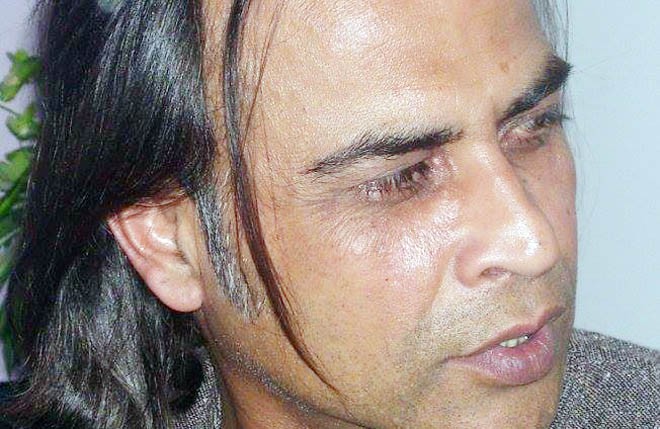
Reading Hussain Abid as the meaning breaks down and certain aesthetics peel off the poems

One evening in early 2014, I was sitting on the desk in a newsroom in Lahore, chatting with my colleagues before getting down to work. Irfan Aslam, a journalist and friend, remained aloof, absorbed in a book with the title Qehqaha Insan Ney Ijad Kiya facing us. A senior colleague, intrigued, took the book from his hands. After leafing through a few pages, the colleague handed the book back to Aslam, with the ‘dimissive’ words : "Poetry es trah di hun di ay!" (What kind of poetry this is!) A qehqha (a loud laughter) emerged out of Aslam’s mouth.
I took the book and read some poems. It was my first introduction to Hussain Abid. The book, co-written with Masood Qamar and the late Javed Anwar, had the taste of postmodern poetry, with meaning breaking down and a certain aesthetics peeling off the poem as it started suddenly, went down a little and then just ended; leaving the reader wondering: what was it?
I befriended Hussain Abid on Facebook and the first poem I read on his wall was:
Trained to sum up my reactions to creative expressions in an often clichéd diction, I commented with disdain and indifference on the post: "It has a certain aesthetics of absurdity but that’s it. Or there is more to it which my mind, not hit by such a rain, can’t appreciate?" His response was: "The reader always has his or her angle of perception and observation and that is good."
What should have been just another read, a momentary virtual event while browsing up and down my Facebook newsfeed, stayed with me for days -- with the feel of rainy nails hitting through the bones of my skull and entering the ground after passing through my feet on the muddy, slippery ground underneath.
I was under the spell of the poet and his poetry, and have been ever since.
After I moved to the US for a PhD in Sociocultural Anthropology, I kept following his poetry. As my understanding of social theory expanded, I have come to realise that nothing expresses the proximity of life’s happenings -- and the wonder that ensues -- more beautifully than poetry. Abid is a poet who seems to have started off with more traditional forms, such as ghazal, kafi, and paband nazm in the 1990s, with his first book Utrti koonjein. His kafis -- though he wrote very few -- have had me in their flow quite often. As a sample, see this one:
Since his first book of poetry, published in 1998, to the latter work, comprising Dhundlaey Din ki Hiddat, Qehqaha Insan Ney Ijad Kiya and Kaghaz Peh Bni Dhoop (the latter co-written with Masood Qamar and Javed Anwar) to the more recent unpublished poems, one can see the learning curve, the evolutionary trajectory of Abid and his poetry.
He writes about life, with particular and recurrent attention to themes ranging from fundamental human desire to be able to express himself, the existential angst, the search for the human beyond the deceptive cloak of ‘civilisational’ cloak, and religious and patriarchal oppressions. His metaphors stick to your mind and have quite a visceral effect on your poetic and human sensibility. He takes the simple and the ordinary and, with the brilliance of his capacity to wonder and wander, turns it into a creative act of writing, leaving us longing for more space to breathe in the kind of world we live.
If in the poems like ‘Shehr Thakta Nhein Hai’, and ‘Dhol Phat-ta Nhein Hai’, he seems to burst with the shriek of someone dying for the necessary change, in poems like ‘Urya’n Badan ka Mastoor Chehra’ and ‘Khadion pr B[u]nay Log’, he very artistically touches on patriarchal deception and the longing for what Rousseau might have called ‘the noble savage’, ‘the man in the nature’.
Despite wandering here and there, the most dominant and recurrent theme in his varied voice is displacement. The metaphors of River Ravi and the Rhine flow and bleed into each other, as he lives his days in Germany and writes, mostly, on things happening in Pakistan.
Offline, I have met Abid twice, for a day each time, with one and a half year in between the two meetings. It’s interesting to get to know the person behind the words; the two could converge and diverge in interesting and intriguing ways. Married to a German woman since 1990s, he speaks German with his family, loves to speak Punjabi and writes in Urdu. Before he left for Germany, he studied medicine, psychiatry to be specific, at the Punjab Medical College but did not "thankfully pursue the studies further". A musician at heart, like his wife, Kathrina, he spends his time going to places and playing for love and fun.
I am no critic, only a lover and reader of poetry. Sometimes I write it, too, to learn writing and responding to and understanding life. Reading others is an essential part of this journey, and Abid has a lot to offer me as a reader and writer, as he does for many others like me.
What he has already produced affirms his status as a remarkable poet in Urdu. What he is producing recently is so fresh, something that has a universality of appeal, both in terms of content and form has he has adopted lately: free verse. He is the man, a metaphor for something in us all that longs for leaving this fear-ridden end of the world and landing on the other, more peaceful side.